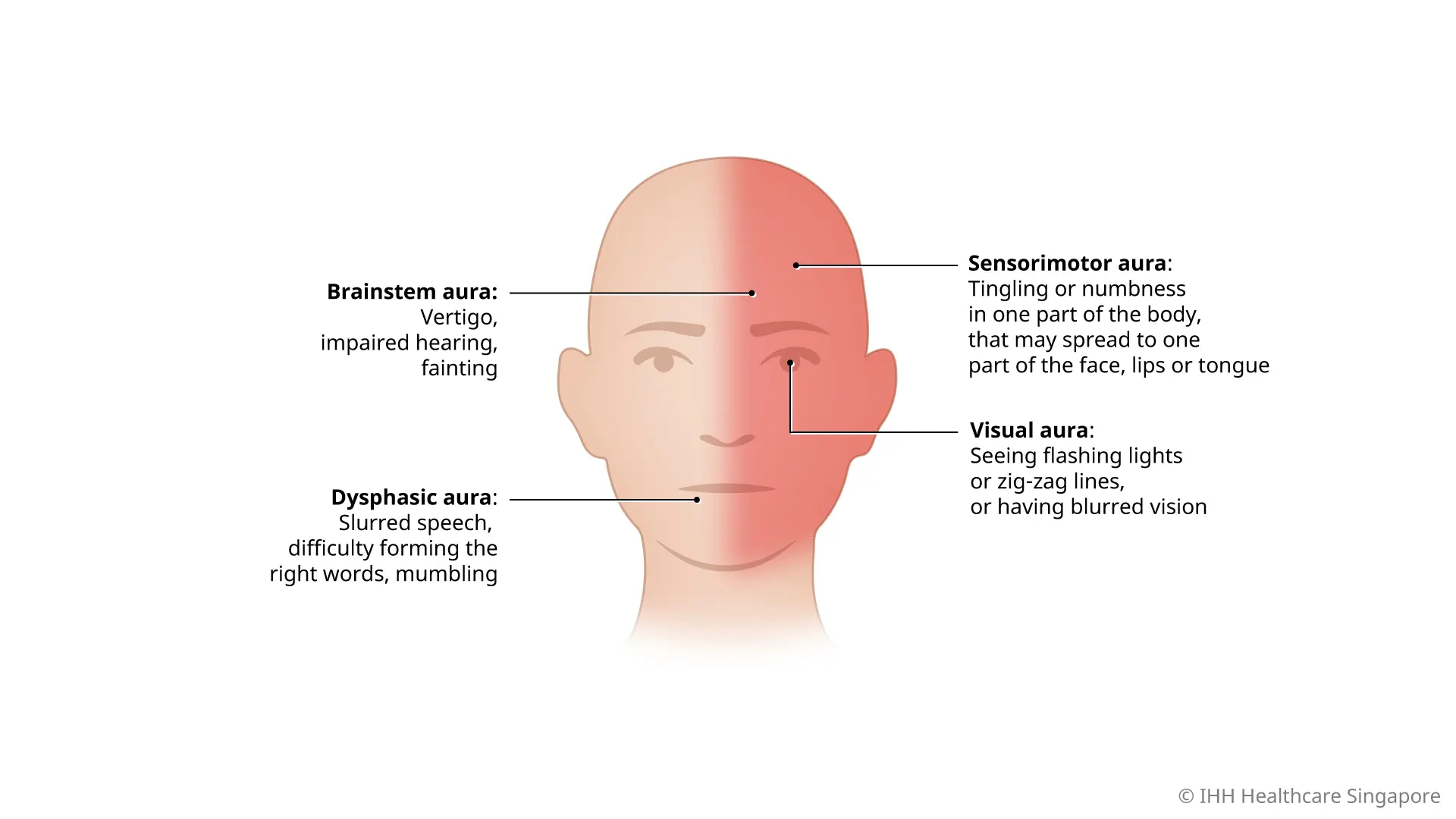
Migraine
What is a migraine?
A migraine is a complex neurological disorder characterised by a distinctive type of headache with intense, throbbing pain. Additionally, many people experience accompanying symptoms such as nausea, vomiting, and heightened sensitivity to sound, light, and movement.
As a primary headache disorder, migraine has its own unique pathophysiology and is not caused by another underlying condition. Instead, it represents an individual's inherent predisposition to experience recurrent headaches.
Types of migraine
Migraines can be classified based on the presence of aura or by the frequency of migraines:
Presence of aura
- Migraines with aura refer to migraines with visual disturbances and other neurological symptoms that appear about 10 — 60 minutes before the start of a headache.
- Migraines without aura prior to the start of a headache are more common.
Frequency
- Infrequent migraines refer to migraines that occur fewer than 4 days per month, for a period of 3 months.
- Episodic migraines occur at a frequency of 4-14 days per month for a period of 3 months, with migraine features such as nausea, vomiting, photosensitivity or phonosensitivity on at least 8 days of each month.
- Chronic migraines occur 15 or more days per month for more than 3 months, with migraine features such as nausea, vomiting, photosensitivity or phonosensitivity on at least 8 days of each month.
What are the symptoms of a migraine?
Migraine symptoms can vary from one person to another but commonly include:
- Severe, throbbing headache
- Sensitivity to light and/or sound
- Nausea and vomiting
- Dizziness or vertigo
- Fatigue or lethargy
- Visual disturbances
- Neck pain prior to headache onset
When to seek medical attention
It is important to consult a doctor about migraines if you experience any of the following scenarios:
Frequent or severe migraines. If your migraines are frequent, severe, or are increasingly impacting your daily life, professional medical advice is essential to manage the condition effectively.
Change in migraine pattern. Any noticeable changes in your migraine attacks, such as increased intensity, frequency, or duration, warrant a doctor's evaluation.
Unusual symptoms such as changes in the type of migraines you might be facing, an unusually severe headache or a headache that is accompanied by symptoms such as confusion, fever, stiff neck, seizures, double vision, weakness, or trouble speaking.
Migraine with aura. While not uncommon, migraines with aura (visual disturbances or other sensory changes) should be discussed with a doctor, particularly if the aura is prolonged, lasts longer than an hour, or you experience aura without a subsequent headache.
Over-the-counter medication ineffectiveness. If over-the-counter pain relief medications do not alleviate your migraine symptoms or if you find yourself needing to take frequent painkillers.
Impact on daily life. If migraines limit your ability to perform daily tasks, such as attending work or school, it's important to see a doctor to manage the severity and progression of migraine
Signs of a more serious condition. Immediate medical attention is required if you experience a headache following a head injury, a sudden and explosive headache (thunderclap headache), or a headache accompanied by fever, stiff neck, rash, confusion, seizure, double vision, weakness, numbness, or difficulty speaking, as these could be signs of more serious conditions.
Consulting a healthcare professional will help in accurately diagnosing your condition, exploring underlying causes, and formulating a tailored treatment plan to manage your symptoms effectively and prevent worsening and chronification of migraine.
What causes a migraine?
The exact cause of migraines is thought to be linked to genetic predisposition, interplay with environmental and lifestyle factors. Triggers for a migraine attack is varied and personal, and may include:
- Hormonal changes, especially in women (e.g. oestrogen fluctuations)
- Life stressors (Work, school etc)
- Sleep deprivation or changes in sleep patterns
- Physical exertion
- Skipping meals
- Dehydration
- Certain foods and additives
- Environmental changes (e.g. weather or pressure changes)
What are the complications of a migraine?
While a migraine itself is not life-threatening, it can significantly impact one's quality of life. Possible complications include:
- Chronic migraine (headache that occurs more than 15 days a month, over a period of 3 months)
- Medication overuse headaches (headaches that occur more than 10 to 15 days a month, over a period of 3 months due to over-usage of painkillers
- Persistent migraine auras
- Migrainous infarction (strokes caused by migraine)
- Status migrainosus (severe migraine attacks lasting more than 72 hours)
How do you prevent a migraine?
Prevention strategies include:
- Identifying and avoiding triggers
- Regular physical exercise
- Maintaining a consistent sleep schedule
- Stress management techniques such as meditation or yoga
- Preventative medications, as prescribed by a healthcare professional
This coverage checker is brought to you by Health Insured, an online resource that helps you understand your health coverage in Singapore.
This page has been reviewed by our medical content reviewers.
Need help?
For enquiries, please call
+65 6250 0000 (Orchard) or +65 6898 6898 (Novena)
For appointment bookings, please WhatsApp
+65 8111 7777 (Orchard) or +65 8111 5777 (Novena)
 Brain & Spine Care
Brain & Spine Care








